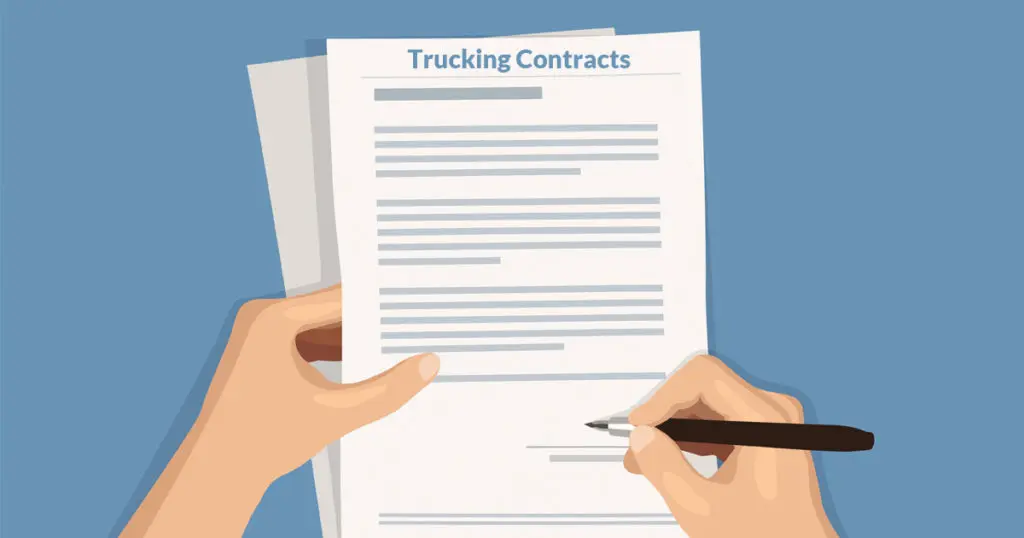Wondering How to Get Trucking Contracts? We Can Tell You!
We all know what a contract is – a legally binding piece of paper that says I will give you this and you will give me that. We both sign on the dotted line and we’re locked in.
But trucking contracts aren’t that cut and dry. In the trucking industry, contracts aren’t always the standard kind. In trucking, there are essentially three types of contracts – verbal agreement, paper or digital, and non-compete or non-solicitation.
Types of Trucking Contracts
Verbal agreement
No paper, no physical contract, probably just a mutual understanding from a conversation and a handshake. But it’s still a contract, and you’re still bound to it.
Paper or digital contract
This one is well-known in that it is formally written and requires a signature. But there could be many levels of obligation. A rate confirmation is the most common paper or digital trucking contract you’ll come across when working for a brokerage. It’s typically an agreement for one load, specifying the rate you’ll be paid and certain conditions of that specific cargo. Another common contract from a broker or shipper might include filling out new carrier packets when you first do business together. These might specify conditions for one load and include wording that will apply those same conditions to all future loads hauled. It could also be a strict, legally airtight contract with a shipper that you enter into an agreement to haul for regularly.
Non-compete or non-solicitation
This type of contract could be verbal, paper, or digital. It means you won’t compete against another party. For example, say you enter into a deal with a broker that is regularly giving you loads to haul from one of his customers, a shipper. A non-compete agreement might be included where you agree to not go around the broker and solicit those loads directly from that shipper.
Build Relationships for Trucking Contracts
We know we just threw a lot of information at you. But it’s important to understand how they work so that you know how to get trucking contracts. While it’s not difficult, it does take dedication and perseverance. Like with any growing business, you need to start somewhere and then build on that. Then you keep building: Use a load board, bid on spot freight, network, and then retain relationships.
Load boards
Load boards are valuable resources at the beginning of a trucking company’s existence and throughout the years as it becomes more established. New trucking company owners need to find loads to haul to stay in business and to develop customer relationships with top shippers and brokers. Later, it’s always beneficial to revisit load boards in search of more loads and more potential relationships. At Apex, we have NextLOAD, our free load board with more than 65,000 loads posted daily. Also, our Apex factoring clients can run credit checks on shippers and brokers they haul for.
Spot freight
Spot freight, which can also be called spot-buy freight, is when a company that needs to ship goods collects multiple quotes (or bids) from various transportation companies for getting those goods from point A to B. Spot freight rates change frequently, even hourly, because that freight is on the open market and carriers need to bid on it competitively to get that load. But when you do get that load, it’s to your benefit to build a relationship with that shipper or broker.
Networking
This is a staple of running any business. You want to get yourself out there in front of your potential customers. You want to further your brand, your reputation, by clearly saying what you’ll do and then doing what you say. Join industry groups online. These would be industry groups where you would find prospective clients. Say, you want to haul dairy products. So, join dairy industry groups. Be visible on social media. And of course, go make phone calls and shake hands. Get out there and find your customers.
Dedicated lanes
When you build relationships with top shippers and brokers, and they repeatedly give you their business, you are running dedicated lanes. You have established a working relationship that proves profitable for you and trustworthy for them. They know they can count on you to do the job right, and your business grows. Now you have a trucking contract, even if it is just a verbal agreement.
Trucking Contracts Keep the Cash Flowing
You see how this all works together. Trucking contracts – whether verbal, paper or online, or non-compete – benefit all trucking companies. They keep the truck loaded, the tank full, and the cash flowing. Everybody wants that kind of contract.
Speaking of cash flow, Apex factoring can help you manage your cash flow like a pro. We are ready to help keep your trucking company running and growing with each contract and through all dedicated lanes. Visit our website or give us a call at 855-369-2739.
